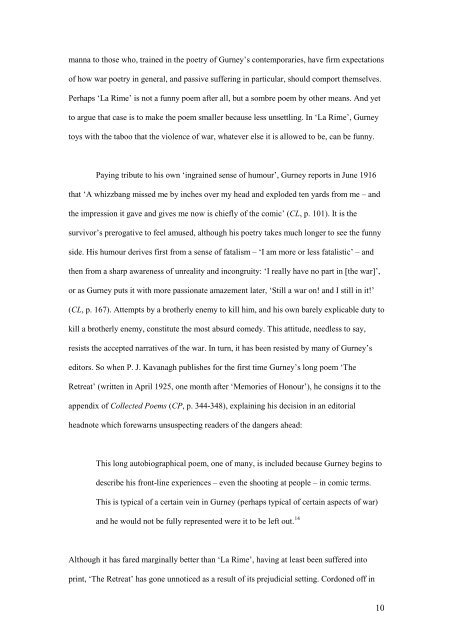Gurney and Fritz.pdf - Exeter Research and Institutional Content ...
Gurney and Fritz.pdf - Exeter Research and Institutional Content ...
Gurney and Fritz.pdf - Exeter Research and Institutional Content ...
You also want an ePaper? Increase the reach of your titles
YUMPU automatically turns print PDFs into web optimized ePapers that Google loves.
manna to those who, trained in the poetry of <strong>Gurney</strong>’s contemporaries, have firm expectations<br />
of how war poetry in general, <strong>and</strong> passive suffering in particular, should comport themselves.<br />
Perhaps ‘La Rime’ is not a funny poem after all, but a sombre poem by other means. And yet<br />
to argue that case is to make the poem smaller because less unsettling. In ‘La Rime’, <strong>Gurney</strong><br />
toys with the taboo that the violence of war, whatever else it is allowed to be, can be funny.<br />
Paying tribute to his own ‘ingrained sense of humour’, <strong>Gurney</strong> reports in June 1916<br />
that ‘A whizzbang missed me by inches over my head <strong>and</strong> exploded ten yards from me – <strong>and</strong><br />
the impression it gave <strong>and</strong> gives me now is chiefly of the comic’ (CL, p. 101). It is the<br />
survivor’s prerogative to feel amused, although his poetry takes much longer to see the funny<br />
side. His humour derives first from a sense of fatalism – ‘I am more or less fatalistic’ – <strong>and</strong><br />
then from a sharp awareness of unreality <strong>and</strong> incongruity: ‘I really have no part in [the war]’,<br />
or as <strong>Gurney</strong> puts it with more passionate amazement later, ‘Still a war on! <strong>and</strong> I still in it!’<br />
(CL, p. 167). Attempts by a brotherly enemy to kill him, <strong>and</strong> his own barely explicable duty to<br />
kill a brotherly enemy, constitute the most absurd comedy. This attitude, needless to say,<br />
resists the accepted narratives of the war. In turn, it has been resisted by many of <strong>Gurney</strong>’s<br />
editors. So when P. J. Kavanagh publishes for the first time <strong>Gurney</strong>’s long poem ‘The<br />
Retreat’ (written in April 1925, one month after ‘Memories of Honour’), he consigns it to the<br />
appendix of Collected Poems (CP, p. 344-348), explaining his decision in an editorial<br />
headnote which forewarns unsuspecting readers of the dangers ahead:<br />
This long autobiographical poem, one of many, is included because <strong>Gurney</strong> begins to<br />
describe his front-line experiences – even the shooting at people – in comic terms.<br />
This is typical of a certain vein in <strong>Gurney</strong> (perhaps typical of certain aspects of war)<br />
<strong>and</strong> he would not be fully represented were it to be left out. 14<br />
Although it has fared marginally better than ‘La Rime’, having at least been suffered into<br />
print, ‘The Retreat’ has gone unnoticed as a result of its prejudicial setting. Cordoned off in<br />
10
















